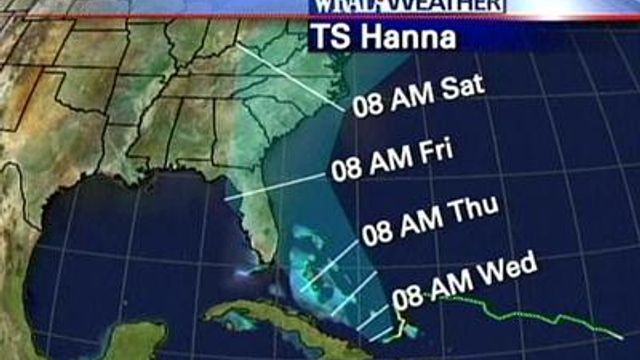RALEIGH, N.C. — The National Hurricane Center has downgraded Hanna to a tropical storm but says it could still regain hurricane strength and threaten the southeast United States by the end of the week.
Gov. Mike Easley activated the State Emergency Response Team as of 7 a.m. Tuesday to prepare in case the system moved toward North Carolina.
“Basically, we all have 36 to 48 hours to get prepared for this storm, and then there could be another one right behind it,” Easley said in a statement, referring to Tropical Storm Ike and Tropical Storm Josephine farther east in the Atlantic Ocean. “So, it is very important for everybody to have their emergency kit, including three days of food, funds, fuel and clothes, ready and have their evacuation plan in place.”
Forecasters say Hanna's center is very near Great Inagua Island and drifting west-southwest at 5 mph. The storm is expected to move over the southeastern Bahamas Tuesday and into the central Bahamas Tuesday night and Wednesday.
The storm's top sustained winds have decreased to near 70 mph – the threshold for hurricane winds is 74 mph. It could regain hurricane strength later Tuesday or Wednesday and threaten the southeast United States by the end of the week.
“We will likely see some effect by Hanna down the road on Friday," WRAL Meteorologist Mike Maze said Tuesday.
Although its path is still uncertain, Easley said Monday that state officials have been preparing for Hanna, and he urged residents to do the same.
"We can't get caught waiting for the storm to make up its mind where it will go," Easley said.
Plans were being developed based on the scenarios of Hurricane Hugo’s track in 1989 that made landfall in Charleston, S.C., and traveled up through Charlotte and into the mountains and Hurricane Fran in 1996 that came ashore near Wilmington and moved northwest into the Triangle area.
The state has put its various specially trained storm teams on alert. They include 25 Swift Water Rescue Teams, 11 Urban Search and Rescue Teams, 36 Wilderness Search and Rescue Teams, 34 State Medical Assistance Teams, seven Public Health Regional Surveillance Teams and seven Regional Response Teams for hazardous materials.
The state emergency warehouse already has food on hand to feed 50,000 people for a day-and-a-half and water for 50,000 people for one day. The state has pre-arranged contracts in place for additional resources including food, water, ice, generators and other emergency needs.
The North Carolina National Guard also was on standby to respond to any recovery and relief efforts.
Hanna ground away at the Bahamas and other Atlantic islands on Tuesday, snapping trees and keeping Providenciales, capital of the Turks and Caicos islands, without power. It hurled rains that caused flooding across Cuba, Haiti and Puerto Rico, where at least one college student died in a rain-swollen river.
Hanna comes one day after Hurricane Gustav plowed into Louisiana before downgrading early Tuesday to a tropical depression with maximum sustained winds of 35 mph at 5 a.m. At least eight deaths were attributed to the storm in the U.S after it killed at least 94 people across the Caribbean.
But New Orleans, still recovering three year after Hurricane Katrina, was largely spared, but a mandatory evacuation order and curfew remained in effect, and nearly 80,000 remained without power after the storm damaged transmission lines that snapped like rubber bands in the wind and knocked 35 substations out of service. (Compare Gustav to Katrina.)
Meanwhile, Tropical Storm Ike was cruising westward across the Atlantic with maximum sustained winds at 60 mph and was projected to near the storm-weary Bahamas by Sunday. It had winds of 50 mph and was expected to grow stronger.
And Tropical Storm Josephine emerged as a new threat in the Atlantic, according to the National Hurricane Center in Miami.
It's still too early to tell whether those storms will pose a threat to the U.S., Maze said.






